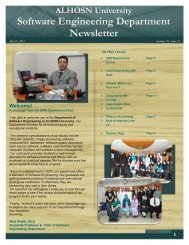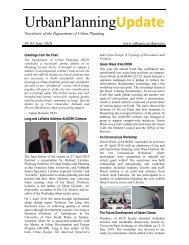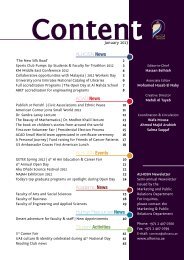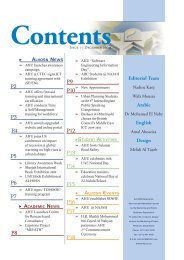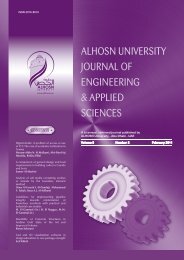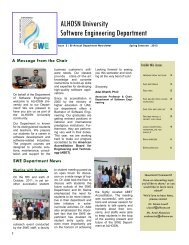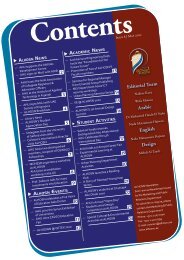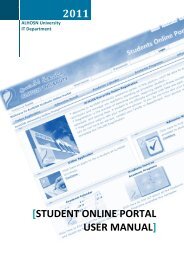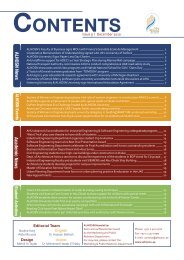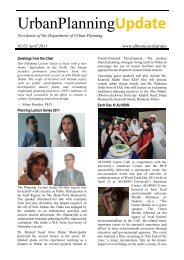ALHOSN University Catalogue Global Knowledge with Local Vision ...
ALHOSN University Catalogue Global Knowledge with Local Vision ...
ALHOSN University Catalogue Global Knowledge with Local Vision ...
Create successful ePaper yourself
Turn your PDF publications into a flip-book with our unique Google optimized e-Paper software.
modeling and simulation, statistical analyses and decision making, quality management, facility management,<br />
planning and control, product design and development, and information technology. The course helps articulate a<br />
globally-orientated perspective of engineering management to emphasize on new challenges for engineering<br />
managers in the new millennium.<br />
MEM 601 Advanced Engineering Economics<br />
Prerequisite: MEM 502 or equivalent<br />
Development of economic performance measures of interest to developers, owners, contractors and users: Sources<br />
of finance and the determinants of the cost of money. Elementary estimating; cost indices; forecasting<br />
techniques; value of money; economic comparison techniques; evaluation of projects in private and public sectors;<br />
tax regulations; inflation; life-cycle costing; risk analysis; non- economic attributes. Case studies of economic<br />
analysis of projects, single building and building components.<br />
MEM 602 Project Management<br />
Prerequisite: MEM 502 or equivalent<br />
This course provides an overview of the discipline of project management. It is done from both a technical<br />
perspective (use of CPM, PERT, work breakdown structure, advanced use of Microsoft Project) and from the<br />
perspective of the practice of project management (project planning, estimating costs and activities length,<br />
human resource planning and on site management, practical role of an effective project manager, project<br />
management vs. quantity surveying, project knowledge management, etc.). This class will also explore the<br />
different types of project organizations (IT, for innovation, for change, construction, etc.)<br />
MEM 603 Statistics and Decision Analysis<br />
Prerequisite: MEM 501 or equivalent<br />
The course introduces students to statistics, the development of a basic theory of decision making under<br />
uncertainty. Other topics include rationales of decision makers, utility, and the concept of the value of perfect<br />
information, the Bayesian approach to decision making; pre-posterior analysis and optimal fixed-sized analysis for<br />
random processes, decision analysis <strong>with</strong> multiple objective, structuring the problem, multi-attributed utility<br />
functions. The course also includes case studies and a course project.<br />
MEM 604 Information Technology Applications in Engineering Projects<br />
Prerequisite: None<br />
Use of computers in estimating, cost engineering, scheduling and resource analyses, materials control, report<br />
generation and operations simulation. Information systems: information-based theories of management;<br />
information technology, cost and value information; analysis, design and implementation of a network based<br />
control system. Considerations for computer usage in construction firms; hardware, software, operations,<br />
economic, human and organizational. Product and process modeling; Internet use in product delivery. A project.<br />
MEM Elective Courses (List 2)<br />
MEM 605 Legal Issues and Contract Administration<br />
Prerequisite: None<br />
Legal concepts and processes applicable to the development of constructed facilities and to the operation of the<br />
construction firm. Emphasis on contract law and contract administration. Case studies.<br />
MEM 606 Planning and Control<br />
Prerequisite: None<br />
Methods of delivering construction. Contractual relationships and organizational structures. Phases of project<br />
development. Estimating resource requirements; costs and durations. Bidding strategies. Network analysis using<br />
CPM and PERT, time-cost trade-off, resource allocation. Cash flow analysis. Earned-value concept for integrated<br />
time and cost control. Quality control. Value engineering. A case study and project.<br />
MEM 607 Advanced Planning and Control<br />
(New code and name: MEM 617 Advanced Simulation Techniques)<br />
Prerequisite: MEM 501<br />
The course introduces students to principles of modeling and simulation, classification and validation of<br />
simulation models, analysis of input data and outputs, Object Oriented Simulation (OOS), simulation languages,<br />
and application of discrete event simulation in various engineering-oriented problems. Simulation models of<br />
discrete, stochastic, and dynamic systems, in terms of procedural behaviors, will be studied. These include<br />
formulating and implementing simulation models, analysis of input and output data, statistical techniques for<br />
models of single systems and competing alternative systems, simulation optimization. Computer program Arena<br />
will be used extensively throughout the course. The course also includes case studies and a course project.<br />
194




